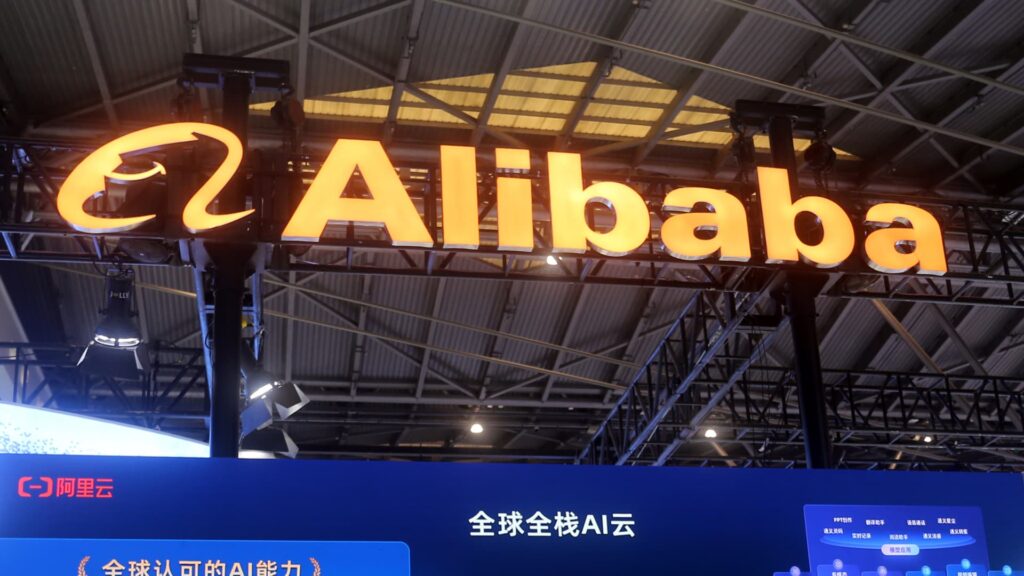Alibaba showcase its AI technology application achievements from Alibaba Cloud at the World Artificial Intelligence Conference in Shanghai, China on July 26, 2025.
Cfoto | Future Publishing | Getty Images
Alibaba could ramp up spending on artificial intelligence beyond its projected levels if demand for the technology continues to remain strong, CEO Eddie Wu said Tuesday, after the Chinese tech giant reported accelerated sales at its key cloud division.
Alibaba’s New York-listed shares were around 4.3% higher in premarket trade as investors looked past a plunge in profitability at the group.
Here’s how the company did in its fiscal second quarter ended Sept. 30 versus LSEG estimates:
Revenue rose 5% to 247.8 billion Chinese yuan ($34.8 billion) versus 242.65 billion yuan the previous year.
Investors are focused on Alibaba’s cloud computing division which books its revenue related to artificial intelligence. Over the past few quarters, Alibaba’s cloud revenue growth has accelerated.
Alibaba reported a 34% year-on-year rise in cloud computing revenue to 39.8 billion yuan versus expectations of 37.9 billion yuan. That growth rate was faster than the 26% notched in the June quarter.
The Chinese tech giant said its investments in AI were helping its cloud unit.
“Robust AI demand further accelerated our Cloud Intelligence Group business, with revenue up 34% and AI-related product revenue achieving triple-digit year-over-year growth for the ninth consecutive quarter,” CEO Eddie Wu said in an earnings statement on Tuesday.

Wu said demand for Alibaba’s AI products is “accelerating.”
“Certainly, we see that customer demand for AI is and remains very strong. In fact, we are not even able to keep pace with the growth in customer demand … in terms of the pace at which we can deploy new servers,” Wu said.
In September, the company said it plans to increase spending on AI models and infrastructure development, on top of the 380 billion yuan ($53 billion) over three years it announced in February. Alibaba said on Tuesday it has spent around 120 billion yuan in capital expenditure toward AI and cloud infrastructure over the past four quarters.
Addressing the capex figure, Wu said that the initial 380 billion yuan target “might be on the small side.” He added that Alibaba “wouldn’t rule out further scaling up that capex investment,” if demand continues to remain strong.
Alibaba has emerged as one of China’s leading AI players. On Monday, Alibaba said its Qwen app, the Chinese giant’s rival to OpenAI’s ChatGPT, surpassed 10 million downloads within the first week of its public launch. The app is powered by Alibaba’s Qwen artificial intelligence models.
Earnings before interest, taxes, and amortization (EBITA), a measure of profitability, increased by 35% to 3.6 billion yuan for its cloud division.
Alibaba CEO plays down AI bubble fears
Wu laid out his view of the market suggesting AI models were not hitting a wall in terms of their capabilities. He said that over the next three years, there will be “a highly definitive trend of demand for AI.”
The Alibaba CEO also said that it is likely that supply chains will remain tight when it comes to companies involved in data centers and semiconductors. This spans across memory chips and semiconductor manufacturers.
“I think in the next three years to come, AI resources will continue to be undersupplied with demand outstripping supply,” Wu said.
Meanwhile, Wu said that graphics processing units, the type designed by Nvidia to run AI workloads and that are being used by U.S. tech gaints are “running at full capacity.” He added that there are GPUs that are three-to-five years old also running at full capacity.
Wu appeared to be addressing the current debate over how long it takes for a GPU to depreciate.
Taking these factors into account, Wu said “we don’t really see much of an issue in terms of a so-called AI bubble” over the next three years.
Investors look past profit drop
Meanwhile, the company has been investing heavily in the cut-throat instant commerce market. This a product offering from Alibaba and some of its Chinese e-commerce rivals that promises super-fast delivery on certain items.
Investment in this new segment has weighed on the profitability of Alibaba’s overall business even as cloud computing remains strong.
Overall adjusted EBITA, a profitability measure closely-watched by analysts, fell 78% year-on-year to 9.1 billion yuan, with Alibaba attributing this partly to its investments in quick commerce.
But investors appear to be looking past this because of the growth acceleration at the cloud computing business and Alibaba’s core China e-commerce division which houses revenue from its online shopping platforms Taobao and Tmall as well as the quick commerce initiative. China e-commerce revenue rose 16% year-on-year to 132.6 billion yuan, with growth coming in faster than the previous quarter.
Revenue from quick commerce surged 60% year-on-year in the quarter versus 12% in the quarter before.
“In our consumption business, quick commerce continued to scale with significant improvement in unit economics and drove rapid growth in monthly active consumers on the Taobao app,” Wu said.
Jiang Fan, who runs Alibaba’s e-commerce business group called quick commerce a “strategic pillar” and said Alibaba aims to have 1 trillion yuan of gross merchandise value, or the value of transactions across the platform, within 3 years.

